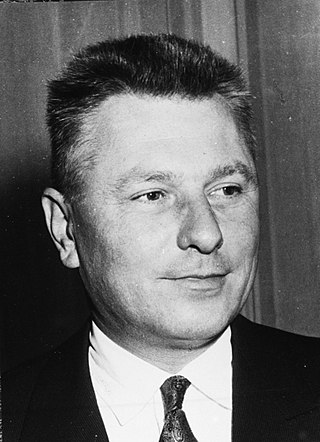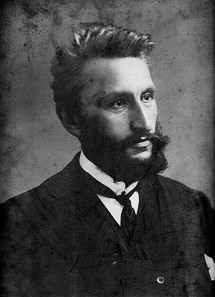Biography
Training as a lawyer at the Free University of Brussels from 1919, Plisnier became a Doctor of Law at the court of appeal of Brussels in 1922. In his youth, he was a member of the Communist Party of Belgium, and worked for the International Red Aid. After visiting the Soviet Union in 1928, he was disillusioned with the country and started sympathizing with the Trotskyist movement, which led to his exclusion from the Communist Party. He later disavowed communism and became a Roman Catholic, but nevertheless remained a Marxist. Plisnier appeared as a heretic to the majority of his contemporaries, as the existence of God never ceased to be an active question for him; throughout his life, he experienced periods of profound atheism and of mystical crisis. [1]
Turning to literature, Plisnier became notable as a writer of family sagas tinged with a critique of bourgeois society. Mariages (1936; in English as Nothing to Chance, 1938) deals with the limitations of social conventions; the five-volume Meurtres (1939–41; "Murders") centres on an idealistic tragic hero, Noël Annequin, in his fight against hypocrisy. A recurring theme in his works is the moral and psychological study of individuals in crisis, such as in L'Enfant aux stigmates (1931; "The Child With Stigmata"), which recalls the fatalism of Maurice Maeterlinck.
Plisnier also wrote poetry: his early poetical works, such as Prière aux mains coupées (1930; "Prayer with Severed Hands"), deal with his struggle to reconcile religion and politics, while Fertilité du désert (1933; ”Fertility of the Desert”) shows an influence of surrealism. His later works of poetry, such as Odes pour retrouver les hommes (1935; "Odes to Meet Again With Men"), Sacré (1938; "Holy", "Sacred") and Ave Genitrix (1943; "Hail Mother"), are more conventional in form and mark a movement back to Christianity. [2]
In 1937, Plisnier won the Prix Goncourt for Faux passeports ("False Passports"; in English as Memoirs of a Secret Revolutionary, 1938), a collection of short stories denouncing Stalinism, in the same spirit as Arthur Koestler. He was the first foreigner to receive Prix Goncourt. [2] He was also an activist of the Walloon movement; at the Walloon National Congress held in Liège in 1945, he gave fiery speeches and called for the unification of Wallonia with France. [1]

Walloons are a Gallo-Romance ethnic group native to Wallonia and the immediate adjacent regions of Flanders, France, Germany, Luxembourg and the Netherlands. Walloons primarily speak langues d'oïl such as Belgian French, Picard and Walloon. Walloons are primarily Roman Catholic, with a historical minority of Protestantism which dates back to the Reformation era.

Wallonia, officially the Walloon Region, is one of the three regions of Belgium—along with Flanders and Brussels. Covering the southern portion of the country, Wallonia is primarily French-speaking. It accounts for 55% of Belgium's territory, but only a third of its population. The Walloon Region and the French Community of Belgium, which is the political entity responsible for matters related mainly to culture and education, are independent concepts, because the French Community of Belgium encompasses both Wallonia and the bilingual Brussels-Capital Region but not the German-speaking Community of Belgium.
Articles related to Belgium include:
The Liberal Reformist Party was a liberal political party active in Wallonia and Brussels in Belgium. The PRL grew out of the Francophone part of the unitary liberal Party for Freedom and Progress (PVV-PLP) in 1971 and merged into the Reformist Movement (RM) in 2002.
Walloon is a Romance language that is spoken in much of Wallonia and, to a very small extent, in Brussels, Belgium; some villages near Givet, northern France; and a clutch of communities in northeastern Wisconsin, United States.

The Flemish Movement is an umbrella term which encompasses various political groups in the Belgian region of Flanders and, less commonly, in French Flanders. Ideologically, it encompasses groups which have sought to promote Flemish culture and the Dutch language as well as those seeking greater political autonomy for Flanders within Belgium. It also encompasses nationalists who seek the secession of Flanders from Belgium, either through outright independence or (re)unification with the Netherlands.

The Walloon Legion was a unit of the German Army (Wehrmacht) and later of the Waffen-SS recruited among French-speaking collaborationists in German-occupied Belgium during World War II. It was formed in the aftermath of the German invasion of the Soviet Union and fought on the Eastern Front alongside similar formations from other parts of German-occupied Western Europe.
The Communist Party of Belgium was a political party in Belgium from 1921 to 1989. The youth wing of KPB/PCB was known as the Communist Youth of Belgium. The party published a newspaper known as Le Drapeau Rouge in French and De Roode Vaan in Dutch.

Valery Larbaud was a French writer and poet.

Wallonie libre is a minor political party active in Wallonia in Belgium which originated as a group active within the resistance in German-occupied Belgium during World War II. Affiliated with the Walloon Movement, its ideology became increasingly radical in the post-war period.

Ghlin is a sub-municipality of the city of Mons located in the province of Hainaut, Wallonia, Belgium. It was a separate municipality until 1972. On 1 January 1972, it was merged into Mons.
The Walloon Movement is an umbrella term for all Belgium political movements that either assert the existence of a Walloon identity and of Wallonia and/or defend French culture and language within Belgium, either within the framework of the 1830 Deal or either defending the linguistic rights of French-speakers. The movement began as a defence of the primacy of French but later gained political and socio-economic objectives. In French, the terms wallingantisme and wallingants are also used to describe, sometimes pejoratively, the movement and its activists. To a lesser extent, the Walloon Movement is also associated with the representation of the small German-speaking population in the East Belgium of the Walloon Region.
The Walloon Movement traces its ancestry to 1856 when literary and folkloric movements based around the Society of Walloon language and literature began forming. Despite the formation of the Society of Walloon Literature, it was not until around 1880 that a "Walloon and French-speaking defense movement" appeared, following the linguistic laws of the 1870s. The movement asserted the existence of Wallonia and a Walloon identity while maintaining the defense of the French language.
The partition of Belgium is a hypothetical situation, which has been discussed by both Belgian and international media, envisioning a split of Belgium along linguistic divisions, with the Flemish Community (Flanders) and the French-speaking Community (Wallonia) becoming independent states. Alternatively, it is hypothesized that Flanders could join the Netherlands and Wallonia could join France or Luxembourg.

Rattachism or Reunionism is a political ideology which calls for the French-speaking part of Belgium or Wallonia to secede from Belgium and become part of France. Brussels, which is majority French-speaking but enclaved in Flanders, may be included within this ideology; as may the six Flemish municipalities with language facilities for French-speakers around Brussels. It can be considered a French-speaking equivalent of Grootneerlandisme in Flanders.

André Renard was a Belgian trade union leader who, in the aftermath of World War II, became an influential figure within the Walloon Movement.

The royal question was a major political crisis in Belgium that lasted from 1945 to 1951, coming to a head between March and August 1950. The question at stake surrounded whether King Leopold III could return to the country and resume his constitutional role amid allegations that his actions during World War II had been contrary to the provisions of the Belgian Constitution. The crisis brought Belgium to the brink of a civil war. It was eventually resolved by the abdication of Leopold in favour of his son King Baudouin in 1951.

Célestin Demblon was a Belgian socialist politician, teacher and writer, known for his anti-clerical views and his promotion of Francophone Walloon culture. He was also a creative writer in the Symbolist tradition and the author of books on a variety of topics, most notably the Shakespeare authorship question.
Ernest Burnelle was a Belgian politician, member of the Communist Party of Belgium (PCB), and part of the Walloon Movement.










